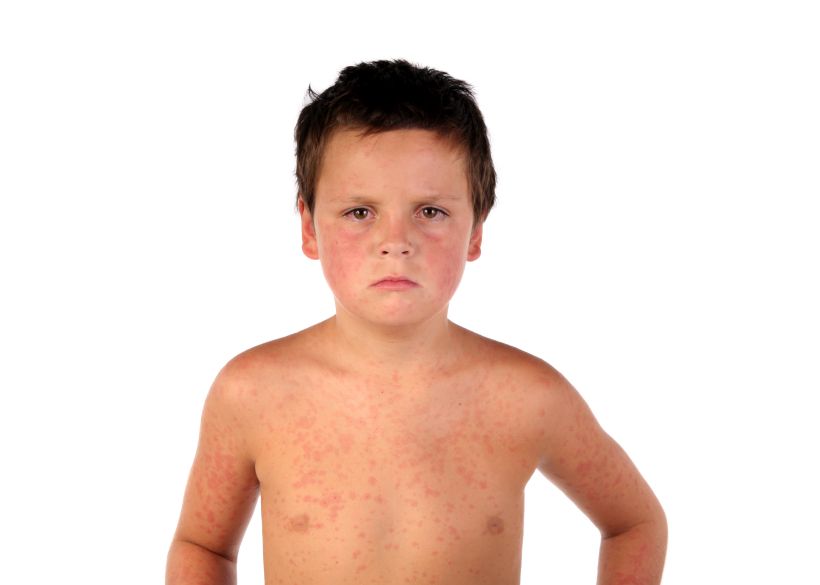Measles Leaves People More Vulnerable to Future Infections
By Dennis ThompsonHealthDay Reporter

THURSDAY, Oct. 31, 2019 (HealthDay News) -- People who contract measles aren't out of the woods after their rash fades and their fever subsides.
They're then more vulnerable to other bacterial and viral infections -- even those they've already been vaccinated against or have had before.
That's because measles virus attacks the cells that serve as the immune system's memory, wiping out established resistance to disease, a pair of new studies report.
As much as three-quarters of a person's immune memory can be wiped out by the "amnesia" caused by the measles virus, one team of researchers reported in the November issue of the journal Science.
"The measles virus is resetting your immune clock to a naive state, and all of the protection you got by living through other viral and bacterial infections is reduced going forward," said senior researcher Stephen Elledge. He is an investigator at Howard Hughes Medical Institute in Chevy Chase, Md., and professor of genetics at Harvard Medical School in Boston. "You could get sick again from the same viruses you previously were immune to."
This immune system "reset" also hampers the body's ability to create antibodies against disease, meaning that new infections are likely to hit harder than before, according to a second team of researchers whose findings appear in the November issue of Science Immunology.
Both studies take their data from a 2013 measles outbreak in the Netherlands.
Families in communities with low vaccination rates agreed to provide blood samples, allowing researchers to observe the effects of a measles infection on non-vaccinated people.
Previous studies had suggested that the effects of measles might persist long after infection, suppressing the immune system, Elledge said. But no one knew why that might be.
Analysis of blood from 77 unvaccinated Dutch children found that the virus eliminated between 11% and 73% of their antibodies, Elledge's team found. Antibodies are the cells that remember past encounters with pathogens and help the body avoid repeat infections.
"People had known that a lot of these immune cells get infected during measles, but they had no idea how much damage was being done," Elledge said.
The more severe a child's infection, the more it damaged their immune system, the researchers found.
"Those antibodies dropped precipitously. They went away very quickly," Elledge said. "This was really surprising. Nobody expected it to happen that quickly, because these kids had only been infected seven weeks ago."
The second team of researchers performed genetic sequencing on antibody genes from 26 Dutch children, before and then 40 to 50 days after their measles infection.
The investigators confirmed the loss of specific immune memory cells that had been built up against other diseases and had been present in the children's blood prior to measles.
But the analysis also showed that the immune system had been reset to an immature state that could produce only a limited repertoire of antibodies, hampering the body's ability to respond to new infections.
Follow-up animal research showed that measles reduced the level of flu antibodies in ferrets that had been vaccinated against influenza, the report said.
The ferrets were then more susceptible to contracting the flu when exposed to influenza virus, and their symptoms were more severe, the findings showed.
Dr. Amesh Adalja is a senior scholar at the Johns Hopkins Center for Health Security in Baltimore. He pointed out that "one of the misconceptions of measles that often fuels vaccine hesitancy is that it is a benign childhood illness. However, that is far from the case. Not only does measles directly cause hospitalizations, pneumonias, brain infections and deaths, it also has a very important secondary impact."
These new studies "underscore the clear and present danger the re-emergence of measles around the world represents and the incalculable value of the measles vaccine," Adalja added.
The immune system still works after a measles infection, but it has to learn all over again how to protect the body, Elledge said.
He recommended that people vaccinated against other diseases who contract the measles should consider getting another round of shots.
These findings reinforce the importance of vaccination against measles, Elledge said.
"We did look at kids who'd been vaccinated with the MMR [measles, mumps, rubella] vaccine, and we did not see the same problems," he said. "The measles virus is much nastier than we realized, and that makes the vaccine that much more valuable."
More information
The U.S. Centers for Disease Control and Prevention has more about the measles.

The news stories provided in Health News and our Health-E News Newsletter are a service of the nationally syndicated HealthDay® news and information company. Stories refer to national trends and breaking health news, and are not necessarily indicative of or always supported by our facility and providers. This information is provided for informational and educational purposes only, and is not intended to be a substitute for medical advice, diagnosis, or treatment.

